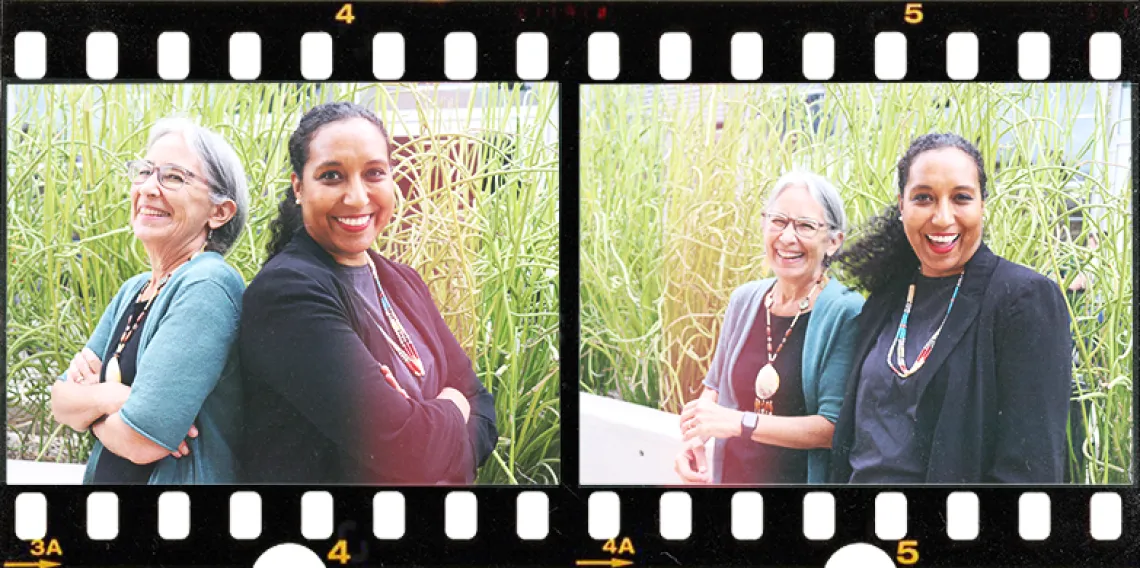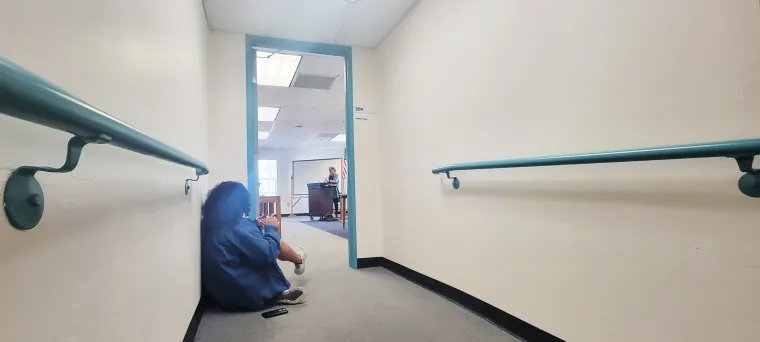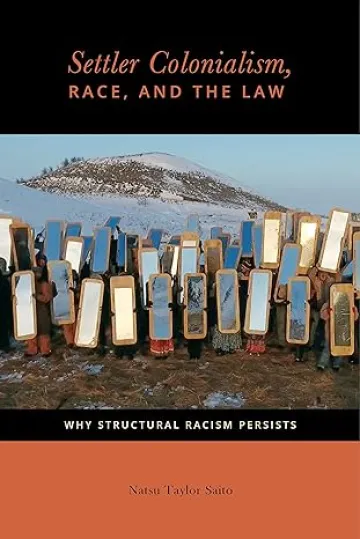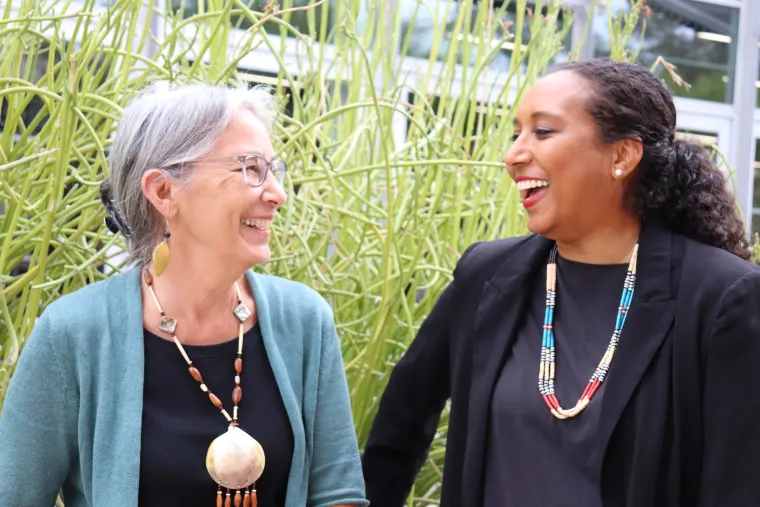Powerhouse Mother-Daughter Duo Step in as Co-Instructors for January in Tucson 2024
Federal Indian law attorney and UArizona Indigenous Peoples’ Law and Policy Program graduate Akilah Kinnison will team up with her mother, distinguished law professor Natsu Taylor Saito, to co-teach a popular course at January in Tucson 2024.

Photo by Craig Baker
You know you’re doing something right when your world-renowned former law professor trusts you to cover one of his classes.
Such is the case with Akilah Kinnison, who will be co-teaching the course “Comparative Legal Systems & Their Role in Nation Building” with none other than her mother, Regents Professor of Law Emerita at Georgia State University Natsu Taylor Saito, at the upcoming January in Tucson (JIT) accelerated Indigenous Governance education event on January 8-10, 2024.
Kinnison is a partner at the law firm Hobbs, Straus, Dean & Walker, LLP, which focuses exclusively on advocating for tribal governments and protecting Indigenous sovereignty. She also serves as a Part-time Professor of Practice at the James E. Rogers College of Law.
On the Shoulders of a Giant

A student watches from outside an open doorway during Saito's standing-room-only talk at the UArizona law school on November 16, 2023.
Photo by Craig Baker
During her tenure as a law student in UArizona’s Indigenous People’s Law and Policy program (IPLP), Kinnison worked as a Research Assistant to UArizona Regents Professor and E. Thomas Sullivan Professor of Law Robert A. Williams, Jr. (Lumbee Tribe), who has taught the “Comparative Legal Systems” course since the first JIT event in 2012.
“Rob (Williams) is a shining light in the field, of course. I would love to have taken this course from him,” says Saito, adding that she and her daughter are focused on “do(ing) justice to the groundwork he has laid” as they step in to cover the course this coming year.
With 50 years of litigation and teaching experience between them, the mother-daughter team of Kinnison and Saito are optimally positioned to offer a unique set of insights to the curriculum originally created by Williams. “It's really an honor to be able to take this course and build off of the materials that (Williams) has and supplement them with what we have to offer,” says Kinnison. She says that, rather than taking the course over, she and her mother feel that they are serving as “custodians” of the course.
Kinnison also says that her experience learning from Williams at UArizona helped lay the groundwork for her proficiency and expertise in the field.
“I have really valued the lessons, the wisdom, the legal knowledge and the tools gained from my time at IPLP,” says Kinnison, “and I find that combination of practical knowledge, tools and theory, along with (the approach of) taking a wide perspective on how to advocate for self-determination for Indigenous peoples has been invaluable in the day-to-day practice of law for me in representing tribes and advocating for tribal interests.”
Fresh Perspectives

Still, Kinnison, who teaches Critical Race Practice at UArizona, hopes to bring a novel perspective to the task of instructing the JIT course with her mother. Starting “from a critical race perspective,” Kinnison says of her personal approach to the content, “people’s stories matter and what anyone has to offer as an academic or a teacher or practitioner is very much based in who they are, where they come from and their own stories.”
Saito, who in addition to her illustrious teaching career is also the author of three books on human rights law
including, most recently, Settler Colonialism, Race, and the Law: Why Structural Racism Persists, says that the duo’s approach to the three-day course will involve beginning with a foundation in Indigenous law and ultimately moving to a look at how Indigenous nations can work within the restrictive framework of existing Western law.
“Indigenous law is inextricably tied to systems of knowledge, and understanding and relating to and exercising responsibilities in the world. And so, in many ways, it's much broader than the Western conception of law,” Saito says, adding:
As it is imposed currently, Western law has attempted to constrict (Indigenous law) and we're looking at what tools are available, especially in international law, to help break that back open again. But we’re not looking to colonially imposed law, including international law, as the solution, necessarily, but as providing tools for Indigenous lawmakers and professionals.
Bringing Joy to Their Work

Photo by Craig Baker
JIT 2024 will be the second time that Kinnison and Saito have taught a course together; the first was a 2013 International Law course at Georgia State soon after Kinnison graduated with her J.D. and Masters degrees. “We had a great time,” says Saito of that experience. “I felt like (Kinnison’s presence) really enriched the course because there were many ways in which things that I had been teaching for a long time were re-energized by her perspectives and what she was bringing from her more recent education and experiences in the field.”
From Kinnison’s standpoint, she says that working as a lawyer in the field of Indigenous law can be challenging, but that having the chance to collaborate with her mother helps her stay locked-in on the joyous and intergenerational aspects of her work.
“The work itself is incredibly important,” says Kinnison:
In terms of advocating for Indigenous self-determination, you're in a settler colonial legal system that is stacked against you and you're fighting for the most important things there are to fight for – children, water – so, when you lose, it's hard. And when you need to be creative, it can sometimes be difficult to summon the joy that really comes with advocating for the people. And so, I personally think that any opportunity we have to find joy in our work together, and in our colleagues, and to learn from one another is really important to keeping that part of ourselves alive that helps us be the best advocates we can be.
Students of Kinnison’s and Saito’s “Comparative Legal Systems” course will no doubt benefit from the joy the two of them bring to the table in this complex and sometimes emotionally charged subject.
“We just have a lot of fun doing this work together,” says Kinnison.
And, according to Saito, the experience of learning won’t be unidirectional, either. “I feel like we're going to learn a lot from our students and that they will have a chance to share their perspectives with each other,” she says. “So, I expect it will be a really exciting and intense, but probably a much more impactful experience than a standard 14-week-semester class.”
It’s a sentiment shared by many former JIT participants, and one that promises to be front and center during this year’s iteration of the popular “Comparative Legal Systems” course.

